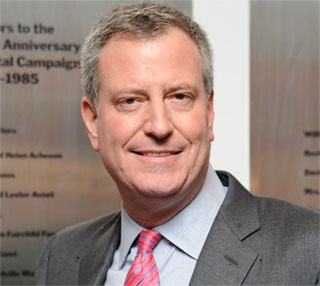Bill de Blasio's mayoral campaign released a wide-ranging policy book today, with a transportation platform that emphasizes the expansion of Select Bus Service, a "Vision Zero" approach to street safety, and the continued growth of the city's bike lane and bike-share networks. De Blasio also pledges to target upzonings and new housing near transit and to build more permeable street surfaces to absorb stormwater.
The transportation platform is the most unequivocal expression of support for safer streets, better surface transit, and increased bicycling so far from de Blasio, who as public advocate has professed skepticism about street transformations like the proposed 34th Street busway, the pedestrianization of Times Square, and protected bike lanes. Some of the goals would require assistance from Albany and the feds, but for the most part they're within the realm of what City Hall can influence: the allocation of street space and city funds.
A few highlights:
- Tops on de Blasio's list is the establishment of a "World-Class Bus Rapid Transit" network and a pledge to phase in more than 20 BRT lines. He refers to several BRT corridors proposed by the Pratt Center for Community Development and says he would commit city capital funds to implementation.
- Taking a page from a 2011 Transportation Alternatives report, de Blasio endorses the "Vision Zero" ethic and says the city should strive to eliminate traffic deaths and serious injuries. On his agenda are the expansion of 20 mph zones to more residential areas, taming wide, high-speed roads like Bruckner Boulevard and Queens Boulevard, and wresting control of speed camera deployment from Albany (obtaining home rule power over automated enforcement would first require state legislation).
- De Blasio explicitly commits to growing the bike lane network and expanding bike-share farther from the downtown core, setting the goal of 6 percent bicycle mode share of all trips citywide by 2020 (currently, according to the Census, around 1 percent of NYC workers primarily commute by bicycle, though that doesn't include the lion's share of trips New Yorkers make). Like mayoral campaign rival Christine Quinn, de Blasio has sought to differentiate his bike policy from Mayor Bloomberg's in terms of the process he would employ, and in the policy book he expands on that thought, saying that through "fliers and door-to-door outreach," he will work to "address feedback before projects are installed."
- On land use, de Blasio says he'll work to focus new housing and high-density development near transit hubs while "preserving lower density neighborhoods located further from mass transit."
- He supports the Comprehensive Solid Waste Management Plan -- designed to reduce truck traffic, especially in low-income neighborhoods -- including the 91st Street Waste Transfer Station, which became a hot-button issue after running into resistance from Upper East Side residents and hasn't always had his support.
The funding components of the platform are less impressive. De Blasio voted against congestion pricing as a City Council member but later came out in favor of East River bridge tolls pegged to the subway fare, and his platform doesn't mention road pricing. To keep MTA fares from rising, he says he would try to get Congress to enact transportation legislation that prioritizes urban needs instead of sprawl -- a fine goal but not something the mayor of New York can influence. Another shaky idea is a proposal to fund the Cross-Harbor Freight Tunnel using city pension funds, which need to generate a higher return than more conventional borrowing options, like plain old bond issuance.
With the exception of Sal Albanese, other Democratic mayoral candidates have also been hesitant to touch the issue of road pricing and realistic sources of funding for the MTA capital program. It's the allocation of street space where the leading contenders are competing, and in this platform de Blasio sets some ambitious targets on that front.






